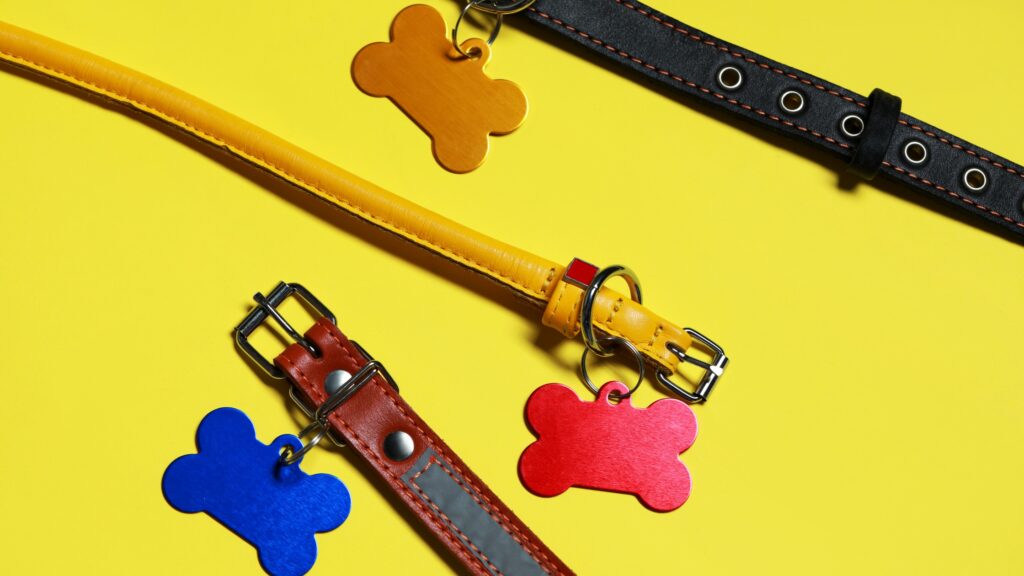Lost pet?
It’s a pet owner’s worst nightmare.
One minute they’re by your side, and the next, they’re nowhere to be found.
Pet owners often underestimate the importance of ID tags until they’re faced with the heart-wrenching experience of a lost pet. It’s a scenario no one wants to imagine, but preparing for the worst can make all the difference in ensuring a happy reunion.

Let’s explore the options and make sure you,
“Never Lose Your Furry Friend Again.”
Why ID Tags Are Essential:
Imagine the panic of realizing your pet is missing. A simple ID tag can turn a distressing situation into a hopeful one.
These tags provide vital information like your pet’s name and your contact details, making it easier for good Samaritans or animal control officers to reunite you with your furry friend quickly.
One of the biggest factors to consider when choosing an ID tag is your pet’s personality and habits. For adventurous pets who love to explore, a GPS tracking tag might provide the peace of mind you need.
On the other hand, homebodies who prefer lounging on the couch might do just fine with a classic engraved tag or a personalized collar.
Another important consideration is the durability of the tag. Pets can be rough on their accessories, especially if they spend a lot of time outdoors. Look for tags made from sturdy materials like stainless steel or silicone that can withstand wear and tear.
So, without further ado, let’s fetch some peace of mind with these 5 top ID tags.
Top ID Tags to Consider:

Classic Engraved Tags
- Pros: These timeless tags are simple, affordable, and readily available at most pet stores. Plus, you can customize them with your pet’s name, your phone number, and any other vital info.
- Cons: While classic engraved tags get the job done, they rely on strangers taking the time to read them and contact you. If your pet wanders off far from home, it might take a while for them to be reunited with you.
QR Code Tags
- Pros: QR code tags take pet identification into the digital age. By scanning the QR code with a smartphone, anyone who finds your pet can instantly access your contact information and get in touch with you.
- Cons: While QR codes are convenient for tech-savvy folks, not everyone knows how to use them. Plus, if your pet’s tag gets damaged or dirty, the QR code might become unreadable.
Personalized Collars
- Pros: Personalized collars are a stylish and practical way to keep your pet safe. With your pet’s name and your phone number embroidered directly onto the collar, there’s no chance of the tag getting lost or damaged.
- Cons: While personalized collars are durable, they’re also visible to anyone who comes into contact with your pet. If you’re concerned about privacy, this might not be the best option for you.
GPS Tracking Tags
- Pros: GPS tracking tags take pet identification to the next level by allowing you to pinpoint your pet’s location in real-time. With these tags, you’ll never have to worry about losing track of your furry friend again.
- Cons: While GPS tracking tags offer unparalleled peace of mind, they come with a higher price tag and often require a monthly subscription fee. Plus, they can be bulky and uncomfortable for some pets to wear.
Microchips
- Pros: Microchips are a permanent form of pet identification that can’t be lost or removed. Once implanted under your pet’s skin, a microchip can be scanned by any veterinarian or animal shelter to access your contact information.
- Cons: While microchips are incredibly effective, they require a trip to the vet for implantation and registration. Plus, they won’t help you locate your pet in real-time like GPS tracking tags.
In addition to contact information, some pet owners choose to include additional details on their pet’s ID tag, such as medical information or dietary restrictions. This can be especially helpful in emergency situations when every second counts.
Finally, don’t forget to regularly check and update your pet’s ID tag. Over time, phone numbers can change, and tags can become worn or damaged. Make it a habit to inspect your pet’s tag periodically to ensure that the information is still accurate and legible.
In the end, the best ID tag for your pet is one that fits their lifestyle and your peace of mind.
Whether you opt for a traditional engraved tag or a cutting-edge GPS tracker, the most important thing is knowing that your furry friend has a ticket home no matter where their adventures take them.